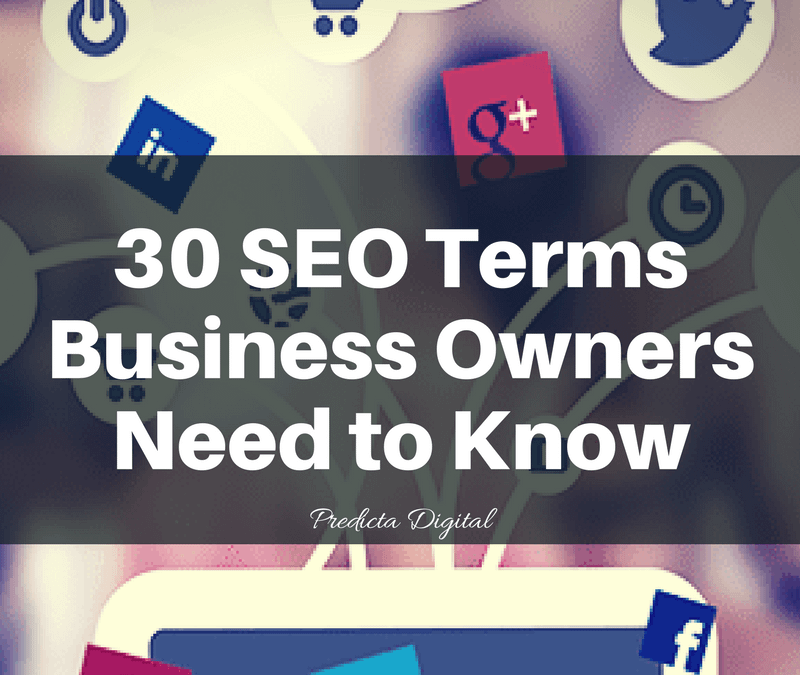SEO Glossary – Terms Business Owners Need to know
SEO is a vast subject, and if you are new to the world of SEOs, here are some of the basic SEO terms that you ought to get familiarized to:
- Anchor Text – The text that links to a webpage is called an Anchor Text. If you enter a keyword in the search engine, the text (link) underlined in blue is called the Anchor Text (it’s purple if you have visited the page earlier).
- ALT Text – Description of an image in an HTML format that search engines can easily read.
- AdWords –Google’s advertising programme (PPC or Pay per Click) to create ads and get paid.
- Algorithm – Formula used by search engines to rank webpages according to relevance or importance for a particular set of keywords.
- Analytics – A tool that tracks or monitors user behaviour is called Analytics and the iteration of its data is called Insights. Example: Google Analytics.
- Blog –A section of your website where you can post original content and generate opportunities through SEO techniques for your business to rank higher on a search engine result. Example of a blog platform: WordPress.
- CSS (Cascading Style Sheets) – The language or a website code that helps in creating the look and format of website.
- Citation – It is a web based reference of your business and its related information such as business name, phone number, address and other core information. Use Google My Business as a structured citation for local business listing.
- Click Through Rate (CTR) – CTR is an important tool to measure how successful your online campaigns are. It is the rate at which users click on a link or an advertisement.
- Content Management System – CMS is a platform where you can easily manage and edit your website even without the knowledge of coding. Examples: WordPress, Drupal, Joomla.
- Conversion – The process of successfully turning a visitor into a customer through the points of a transaction. Conversion rate is the percentage of users which convert into customers.
- Crawler – Also called as a bot or a spider, crawler is a program that moves through the worldwide web to gather data through the link structure and helps in page ranking.
- Geotargeting – Based on the location info, search engines ranks user content based on where the user is. This is done by determining IP address, Zip Code etc.
- Header Tags – Text on a website that is showcased in large and bold fonts to give insights of the page content. They serve as titles as well as hyperlinks.
- Inbound Link – An important factor of search engine’s organic algorithms, which connects another website to your website. Link Building is a marketing practice that helps in collecting more inbound links for attracting more visitors.
- Indexed Pages – Indexing is the method by which search engines store your webpages to optimize the speed with which a searcher can get relevant search results.
- Internal Links – A link of a page on another webpage of the same website.
- Keywords – An important SEO tool for your business that comprises of set of words that target to draw users to your website.
- Long Tail Keywords – Longer and more specific keywords that are searched more infrequently, containing two or more words in a phrase.
- Meta Description – A snippet of text, 160 characters in length, that informs the search engine about the webpage content. It is often displayed below the search engine page title.
- Meta Tags – Hidden and special structure codes at the top of each webpage that provides more information to search engines about the website content.
- Organic SEO – A natural website ranking that is free from paid contents and advertisements.
- PageRank – Google’s Algorithm that determines the popularity of your page based on quality and relevance on a scale of 0-10.
- Pay Per Click (PPC) – Here a business or an advertiser pays each time a searcher clicks on an advertisement.
- Rich Snippets – Micro data or Micro formats that appear as ingredients of a search engine result. Examples: texts, star ratings, prices etc.
- Really Simple Syndication (RSS) feeds – Computer codes produced by content management systems to allow users to receive pings when content is updated on the subscribed website.
- Search Engine Ranking Page (SERPs) – A page that contains a list of websites in response to a search engine query that best matches the entered keywords.
- Social Media Marketing – Brand, business or website promotion with the help of social media platforms.
- Traffic – Amount of visitors to a website which depends on number of visitors and also on number of page clicks.
- Uniform Resource Locator (URL) – Address of a specific webpage. For example: www.predictadigital.com.

